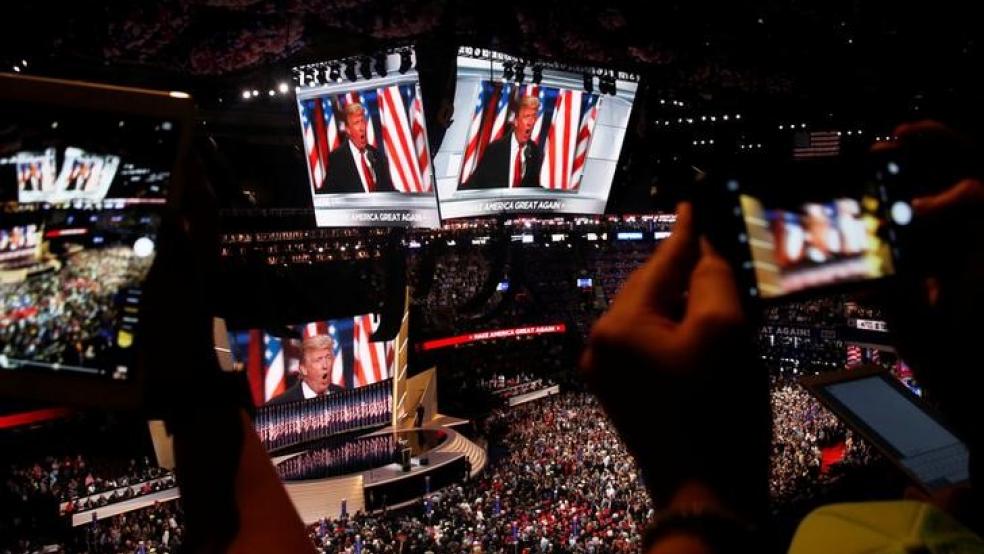The fractious presidential election is taking a toll on the consumer psyche — especially among lower wage earners.
Consumer sentiment in the beginning of October fell to its lowest level since last September and its second lowest reading in two years, according to the University of Michigan Surveys of Consumer Sentiment. The index fell sharply to 87.9 from 91.2 in September.
Related: Donald Trump: A Global Conspiracy Is Out to Get Me
The biggest factor in the decline was a sharp drop in confidence among households with incomes under $75,000 — to the lowest level since August of 2014. Confidence among upper income households remained high, however, at 98.3, close to a level it's been at over the past two years.
"It is likely that the uncertainty surrounding the presidential election had a negative impact, especially among lower income consumers, and without that added uncertainty, the confidence measures may not have weakened," wrote Richard Curtin, chief economist for the Surveys.
Curtin also wrote that any rebound could depend on wage increases and continued job growth. "Prospects for renewed gains, other than a relief rally following the election results, would require somewhat larger wage increases and continued job growth as well as the maintenance of low inflation. Overall, real personal consumption can be expected to increase by 2.5% through mid 2017," he wrote.
Stephen Stanley, chief economist at Amherst Pierpont, said he's not writing off the consumer yet, and says that this could be temporary dampening of sentiment, with a bounce back to come after the election.
Related: Clinton Admits She Didn’t Consider the Consequences of Using a Private Email Server
"There have been examples in the past where sentiment seemed to dip a bit before the election. It's not very long-lasting, and it typically it reverses after," he said. The most dramatic example he recalled was in 1992, when Bill Clinton ran against George H.W. Bush.
"In '92, Michigan (survey) went down four months in a row going into the election, and then bounced 12 points in November and another six in December," he said.
Divide between low earners, high earners
But he also said the divide in views between lower wage earners and higher income households illustrates a problem economists and the Federal Reserve have been struggling with: a slowly growing economy, and a lack of productivity growth, mean that wages do not grow.
Inflation expectations in the survey also fell, to 2.4 percent, which would be an all-time low for the survey if it holds in the final October number, according to Goldman Sachs economists.
"The composition of the sentiment index was also unfavorable, as the measure of consumers' future expectations — which we have found to be a useful leading indicator — fell by 6.1 points to 76.6. This was partly offset by a 1.3 point increase in consumers' assessment of their current economic conditions," according to the Goldman economists.
Stanley said the tone of the election is a likely factor. "It's just gotten so low in the gutter as can be imagined. If other people are seeing this the way I am, it's depressing. Maybe I'm a little more bummed out than I might normally be just because of the tone of the campaign."
The economy has also been a punching bag for Republican Donald Trump, and it's clear there's a lot of dissatisfaction with the economy, which makes it harder for Democrat Hillary Clinton to defend President Obama's policies.
"You don't have that countervailing force. You have Trump pounding the table that things are terrible," said Stanley, who added "…that might argue for having a negative impact on people's attitudes."
Tom Simons, chief money market economist at Jefferies, said in a note that consumers in the survey continued to expect Clinton will beat Trump.
"Clinton has been ahead of Trump since June when they first began asking the question, but the lead increased somewhat in October. With regard to which candidate is viewed as being better for the economy, Clinton narrowly edged Trump, but the majority of consumers responded that the outcome of the election made no difference," he wrote in a note.
This article originally appeared on CNBC. Read more from CNBC:
Trump attacks Mexican billionaire for allegedly trying to influence US election
Bernie Sanders tweet sends shares of Ariad Pharmaceuticals down 11%
Growth of shadow banking spurs warnings of a new credit crisis




